Nurses Narratives - Matron A Kellett - Part 4
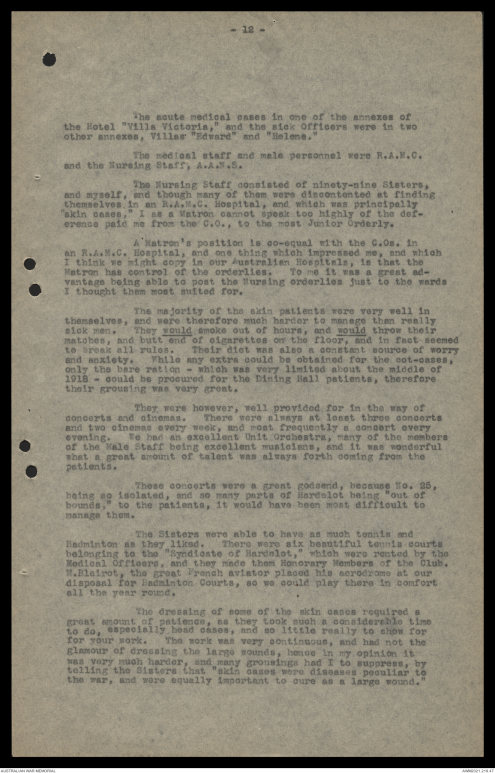
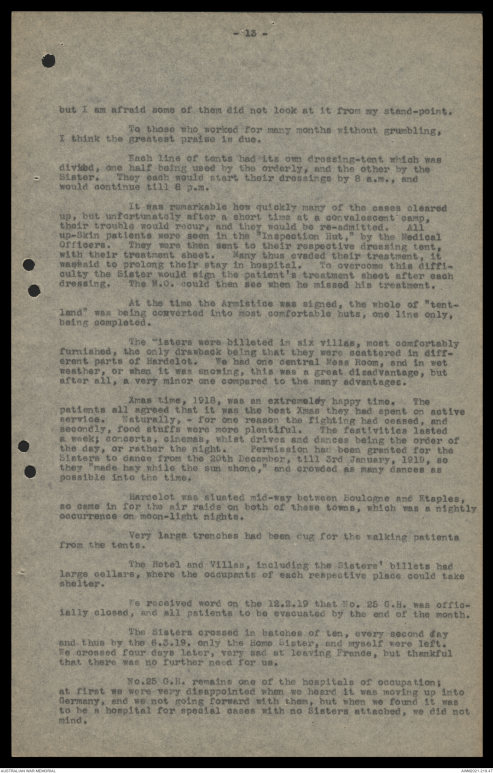
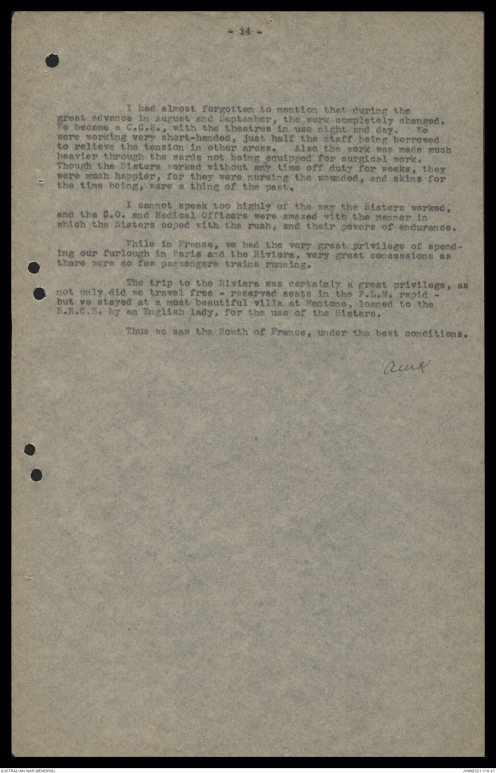
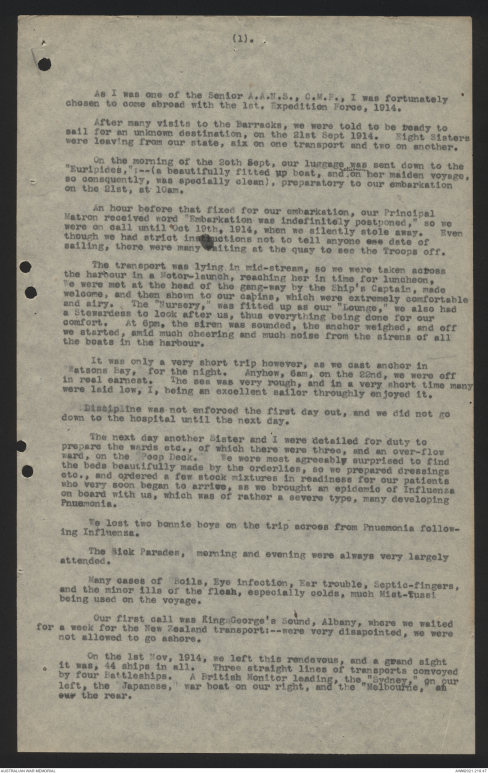
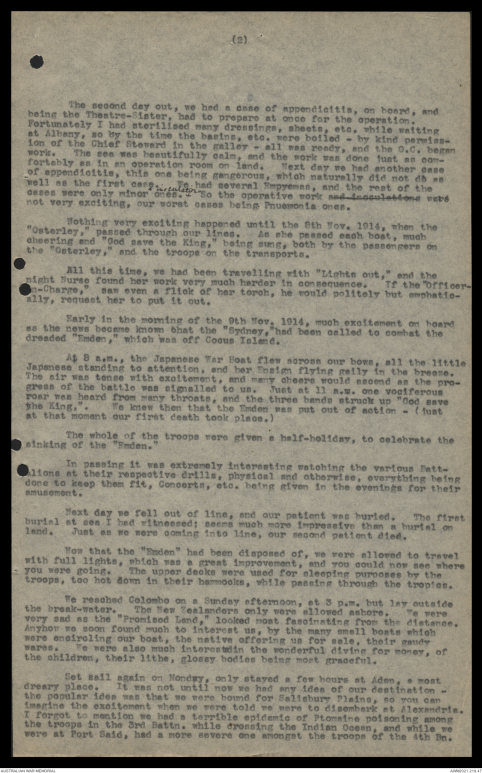
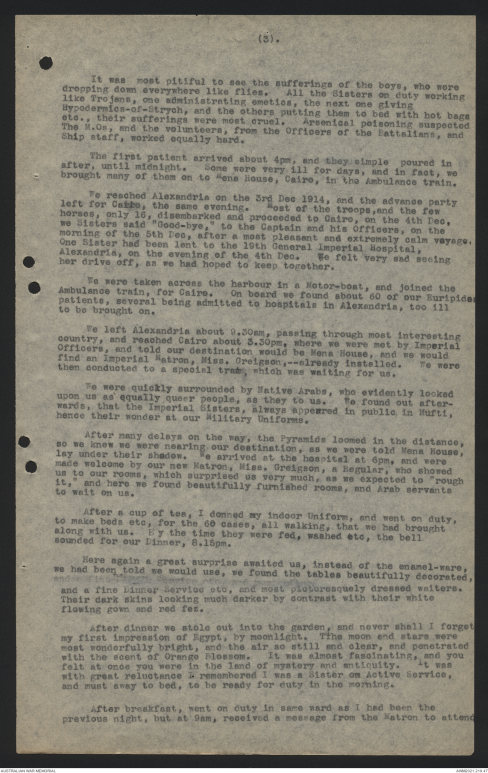

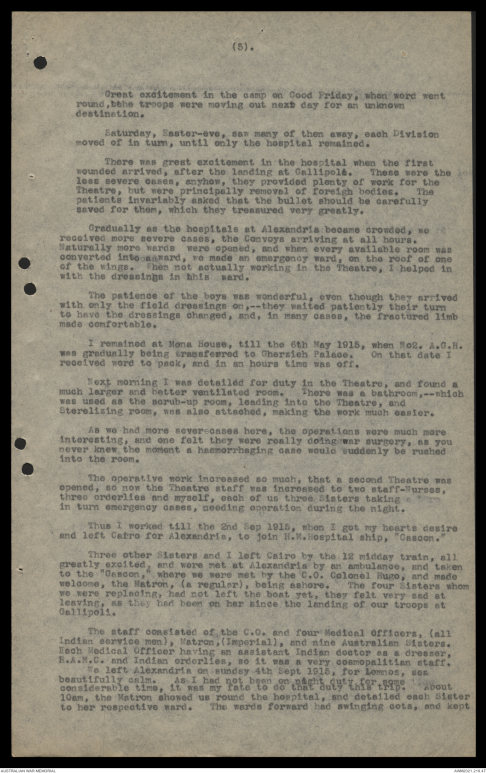
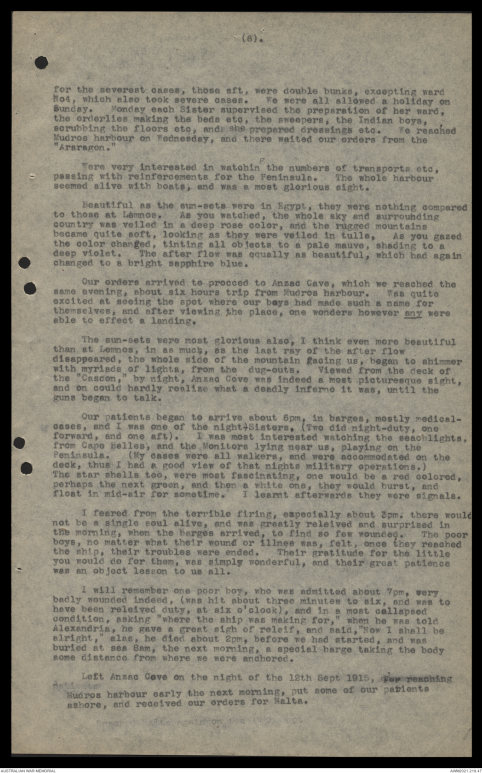
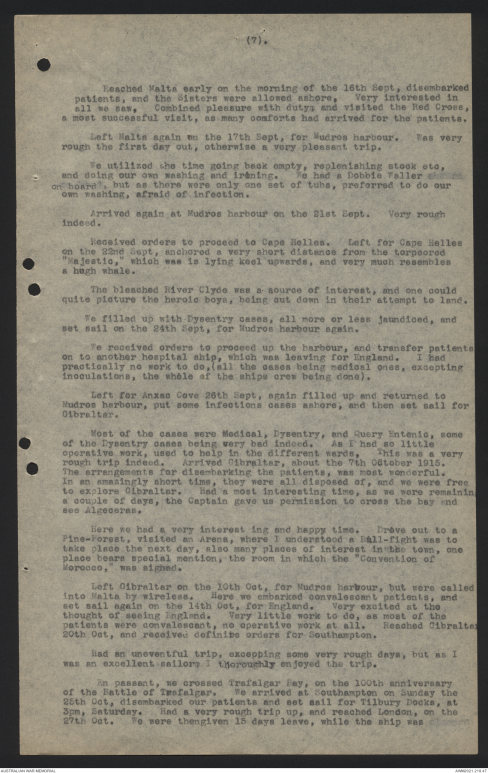
-12-
The acute medical cases in one of the annexes of
the Hotel "Villa Victoria," and the sick Officers were in two
other annexes, Villas "Edward" and Helene."
The medical staff and male personnel were R.A.M.C.
and the Nursing Staff, A.A.N.S.
The Nursing staff consisted of ninety-nine Sisters,
and myself, and though many of them were discontented at finding
themselves in an R.A.M.C. Hospital, and which was principally
"skin cases," I as a Matron cannot speak too highly of the deference
paid me from the C.O., to the most Junior Orderly.
A matron's position is co-equal with the C.Os. in
an R.A.M.C. Hospital, and one thing which impressed me, and which
I think we might copy in our Australian Hospitals, is that the
Matron has control of the orderlies. To me it was a great advantage
being able to post the Nursing orderlies just to the wards
I thought them most suited for.
The majority of the skin patients were very well in
themselves, and were therefore much harder to manage than really
sick men. They would smoke out of hours, and would throw their
matches, and butt end of cigarettes in the floor, and in fact seemed
to break all rules. Their diet was also a constant source of worry
and anxiety. While any extra could be obtained for the cot-cases,
only the bare ration - which was very limited about the middle of
1918 - could be procured for the Dining Hall patients, therefore
their grousing was very great.
They were however, well provided for in the way of
concerts and cinemas. There were always at least three concerts
and two cinemas every week, and most frequently a concert every
evening. We had an excellent Unit Orchestra, many of the members
of the Male Staff being excellent musicians, and it was wonderful
what a great amount of talent was always forth coming from the
patients.
These concerts were a great godsend, because No. 25,
being so isolated, and so many parts of Hardelot being "out of
bounds," to the patients, it would have been most difficult to
manage them.
The Sisters were able to have as much tennis and
Badminton as they liked. There were six beautiful tennis courts
belonging to the "Syndicate of Hardelot," which were rented by the
Medical Officers, and they made them Honorary Members of the Club.
W.Blairot, the great French aviator placed his aerodrome at our
disposal for Badminton Courts, so we could play there in comfort
all the year round.
The dressing of some of the skin cases required a
great amount of patience, as they took such a considerable time
to do, especially head cases, and so little really to show for
for your work. The work was very continuous, and had not the
glamour of dressing the large wounds, hence in my opinion it
was very much harder, and many grousings had I to suppress, by
telling the Sisters that "skin cases were diseases peculiar to
the war, and were equally important to cure as a large wound."
-13-
but I am afraid some of them did not look at it from my stand-point.
To those who worked for many months without grumbling,
I think the greatest praise is due.
Each line of tents had its own dressing-tent which was
divided, one half being used by the orderly, and the other by the
Sister. They each would start their dressings by 8 a.m., and
would continue till 8 p.m.
It was remarkable how quickly many of the cases cleared
up, but unfortunately after a short time at a convalescent camp,
their trouble would recur, and they would be re-admitted. All
up-Skin patients were seen in the "Inspection Hut," by the Medical
Officers. They were then sent to their respective dressing tent,
with their treatment sheet. Many thus evaded their treatment, it
was said to prolong their stay in hospital. To overcome this difficulty
the Sister would sign patient's treatment sheet after each
dressing. The M.O. could then see when he missed his treatment.
At the time the Armistice was signed, the whole of "tent-land"
was being converted into most comfortable huts, one line only,
being completed.
The Sisters were billeted in six villas, most comfortably
furnished, the only drawback being that they were scattered in different
parts of Hardelot. We had one central Mess Room, and in wet
weather, or when it was snowing, this was a great disadvantage, but
after all, a very minor one compared to the many advantages.
Xmas time, 1918, was an extremeley happy time. The
patients all agreed that it was the best Xmas they had spent on active
service. Naturally, - for one reason the fighting had ceased, and
secondly, food stuffs were more plentiful. The festivities lasted
a week; concerts, cinemas, whist drives and dances being the order of
the day, or rather the night. Permission had been granted for the
Sisters to dance from the 20th December, till 3rd January, 1919, so
they "made hay while the sun shone," and crowded as many dances as
possible into the time.
Hardelot was siuated mid-way between Boulogne and Etaples,
so came in for the air raids on both of these towns, which was a nightly
occurrence on moon-light nights.
Very large trenches had been dug for the walking patients
from the tents.
The Hotel and Villas, including the Sisters' billets had
large cellars, where the occupants of each respective place could take
shelter.
We received word on the 12.2.19 that No.25 G.H. was officially
closed, and all patients to be evacuated by the end of the month.
The Sisters crossed in batches of ten, every second day
and thus by the 6.3.19 only the Home Sister, and myself were left.
We crossed four days later, very sad at leaving France, but thankful
that there was no further need for us.
No. 25 G.H. remains one if the hospitals of occupation;
at first we were very disappointed when we heard it was moving up into
Germany, and we not going forward with them, but when we found it was
to be a hospital for special cases with no Sisters attached, we did not
mind.
-14-
I had almost forgotten to mention that during the
great advance in August and September, the work completely changed.
We became a C.G.S., with the theatres in use night and day. We
were working very short-handed, just half the staff being borrowed
to relieve the tension in other areas. Also the work was made much
heavier through the wards not being equipped for surgical work.
Though the Sisters worked without any time off duty for weeks, they
were much happier, for they were nursing the wounded, and skins for
the time being, were a thing of the past.
I cannot speak too highly of the way the Sisters worked,
and the C.O. and Medical Officers were amazed with the manner in
which the Sisters coped with the rush, and their powers of endurance.
While in France, we had the very great privilege of spending
our furlough in Paris and the Riviera, very great concessions as
there were so few passengers trains running.
The trip to the Riviera was certainly a great privilege, as
not only did we travel free - reserved seats in the P.L.M. rapid -
but we stayed at a most beautiful villa at Mentone, loaned to the
H.R.C.S. by an English lady, for the use of the Sisters.
Thus we saw the South of France, under the best conditions.
AMK
(1).
As I was one of the Senior A.A.N.S., C.M.F., I was fortunately
chosen to come abroad with the 1st. Expedition Force, 1914.
After many visits to the Barracks, we were told to be ready to
sail for an unknown destination, on the 21st Sept 1914. Eight Sisters
were leaving from our state, six on one transport and two on another.
On the morning of the 20th Sept, our luggage was sent down to the
"Euripides,"--(a beautifully fitted up boat, and on her maiden voyage,
so consequently, was specially clean), preparatory to our embarkation
on the 21st, at 10am.
An hour before that fixed for our embarkation, our Principal
Matron received word "Embarkation was indefinitely postponed," so we
were on call until Oct 19th, 1914, when we silently stole away. Even
though we had strict instructions not to tell anyone our date of
sailing, there were many waiting at the quay to see the Troops off.
The transport was lying in mid-stream, so we were taken across
the harbour in a Motor-launch, reaching he in time for luncheon,
We were met at the head of the gang-way by the ship's Captain, made
welcome, and then shown to our cabins, which were extremely comfortable
and airy. The "Nursery," was fitted up as our "Lounge," we also had
a Stewardess to look after us, thus everything being done for our
comfort. At 6 pm, the siren was sounded, the anchor weighed, and off
we started, amid much cheering and much noise from the sirens of all
the boats in the harbour.
It was only a very short trip however, as we cast anchor in
Watsons Bay, for the night. Anyhow, 6 am, on the 22nd, we were off
in real earnest. The sea was very rough, and in a very short time many
were laid low, I, being an excellent sailor thoroughly enjoyed it.
Discipline was not enforced the first day out, and we did not go
down to the hospital until the next day.
The next day another Sister and I were detailed for duty to
prepare the wards etc., of which there were three, and an over-flow
ward, on the Poop Deck. We were most agreeably surprised to find
the beds beautifully made by the orderlies, so we prepared dressings
etc., and ordered a few stock mixtures in readiness for our patients
who very soon began to arrive, as we brought an epidemic of Influenza
on board with us, which was of rather a severe type, many developing
Pneumonia.
We lost two bonnie boys on the trip across from Pneumonia following
Influenza.
The Sick Parades, morning and evening were always very largely
attended.
Many cases of Boils, Eye Infection, Ear trouble, Septic-fingers,
and minor ills of the flesh, especially colds, much Mist-Tussi
being used on the voyage.
Our first call was King George's Sound, Albany, where we waited
a week for the New Zealand transport--were very disappointed, we were
not allowed to go ashore.
On the 1st Nov, 1914, we left this rendevous, and a grand sight
it was, 44 ships in all. Three straight lines of transports convoyed
by four Battleships. A British Monitor leading, the "Sydney," on our
left, the Japanese, war boat on our right, and the "Melbourne," on
our the rear.
(2)
The second day out, we had a case of appendicitis, on board, and
being the Theatre-Sister, had to prepare at once for the operation.
Fortunately I had sterilised many dressings, sheets, etc. while waiting
at Albany, so by the time the basins, etc. were boiled - by kind permiss-
ion of the Chief Steward in the galley - all was ready, and the O.C. began
work. The sea was beautifully calm, and the work, was done fast as comfortably
as in an operation room on land. Next day we had another case
of appendicitis, this one being gangerous, which naturally did not do
as well as the first case. We had several Empyemas, and the rest of the
cases were only minor ones. [[?]] So the operative work and inoculations were
not very exciting, our worst cases being Pneumonia ones.
Nothing very exciting happened until the 8th Nov, 1914, when the
"Osterley," passed through our lines. As she passed each boat, much
cheering and "God save the King," being sung, both by the passengers on
the "Osterley," and the troops on the transports.
All this time, we had been travelling with "Lights out," and the
Night nurse found her work very much harder in consequence. If the "Officer-
in-Charge," saw even a flick of her torch, he would politely but emphatic-
ally, request her to put it out.
Early in the morning of the 9th Nov, 1914, much excitement on board
as the news became known that the "Sydney." had been called into combat the
dreaded "Emden," which was off Cocus Island.
At 8 a.m., the Japanese War boat flew across our bow, all the little
Japanese standing to attention, and her Ensign Flying gaily in the breeze.
The air was tense with excitement, and many cheers would ascend as the progress
of the battle was signalled to us. Just at 11 a.m. one vociferous
roar was heard from many throats, and the three bands struck up "God save
the King,". We knew that the Emden was put out of action - (just
at that moment our first death took place.)
The whole of the troops were given a half-holiday, to celebrate the
sinking of the "Emden."
In passing it was extremely interesting watching the various Battallions
at their respective drills, physical and otherwise, everything being
done to keep them fit, Concerts, etc. being given in the evenings for their
amusement.
Next day we fell out of line, and our patient was buried. The first
burial at sea I had witnessed; seems much more impressive than a burial on
land. Just as we were coming into line, our second patient died.
Now that the "Emden had been disposed of, we were allowed to travel
with full lights, which was a great improvement, and you could now see where
you were going. The upper decks were used for sleeping purposes by the
troops, too hot down in their hammocks, while passing through the tropics.
We reached Colombo on a Sunday afternoon, at 3 p.m. but lay outside
the break-water. The New Zealanders only were allowed ashore. We were
very sad as the "Promised Land," looked most fascinating from the distance.
Anyhow we soon found much to interest us, by the many small boats which
were encircling our boat, the natives offering us for sale, their gaudy
wares. We were also much interested in the wonderful diving for money, and
the children, their little, glossy bodies being most graceful.
Set sail again on Monday, only stayed a few hours at Aden, a most
dreary place. It was not until now we had any idea of our destination
the popular idea was that we were bound for Salisbury Plains, so you can
imagine the excitement when we were told we were to disembark at Alexandria.
I forgot to mention we had a terrible epidemic of Ptomains poisoning and
the troops in the 3rd Battn. while crossing the Indian Ocean, and while
were at Port Said, had a more severe case one amongst the troops of the 4th Bn.
(3).
It was most pitiful to see the sufferings of the boys, who were
dropping down everywhere like flies. All the Sisters on duty working
like Trojans, one administrating emetics, the next one giving
Hypodermics-of-Strych, and the others putting them to bed with hot bags
etc., their sufferings were most cruel. Arsenical poisoning suspected
The M.Os, and the volunteers, from the Officers of the Battalions, and
Ship staff, worked equally hard.
The first patient arrived about 4 pm, and they simple poured in
after, until midnight. Some were very ill for days, and in fact, we
brought many of them on to Mena House, Cairo, in the Ambulance train.
We reached Alexandria on the 3rd Dec 1914, and the advance party
left for Cairo, the same evening. Most of the troops ,and the few
horses, only 16, disembarked and proceeded to Cairo, on the 4th Dec,
we Sisters said "Good-bye," to the Captain and his Officers, on the
morning of the 5th Dec, after a most pleasant and extremely calm voyage.
One Sister had been lent to the 19 General Imperial Hospital,
Alexandria, on the evening of the 4th Dec. We felt very sad seeing
her drive off, as we had hoped to keep together.
We were taken across the harbour in a Motor-boat, and joined the
Ambulance train, for Cairo. On board we found about 60 of our Euripide
patients, several being admitted to hospitals in Alexandria, too ill
to be brought on.
We left Alexandria about 9.30am, passing through most interesting
country, and reached Cairo about 3.30pm, where we were met by Imperial
Officers, and told our destination would be Mena House, and we would
find an Imperial Matron, Miss. Greigson,--already installed. We were
then conducted to a special train which was waiting for us.
We were quickly surrounded by Native Arabs, who evidently looked
upon us as equally queer people, as they to us. We found out afterwards,
that the Imperial Sisters, always appeared in public in Mufti,
hence their wonder at our Military Uniforms.
After many delays on the way, the Pyramids loomed in the distance,
so we knew we were nearing our destination, as we were told Mena House,
lay under their shadow. We arrived at the hospital at 6pm, and were
made welcome by our new Matron, Miss Greigson, a Regular, who showed
us to our rooms, which surprised us very much, as we expected to "rough
it," and here we found beautifully furnished rooms, and Arab servants
to wait on us.
After a cup of tea, I donned my indoor Uniform, and went on duty,
to make beds etc. for the 60 cases, all walking, that we had brought
along with us. By the time they were fed, washed etc, the bell
sounded for our Dinner, 8.15pm.
Here again a great surprise awaited us, instead of the enamel-ware,
we had been told we would use, we found the tables beautifully decorated
[[*This next line looks to be rubbed out. I cannot read it*]]
and a fine Dinner Service etc, and most picturesquely dressed waiters.
Their dark skins looking much darker by contrast with their white
flowing gown and red fez.
After dinner we stole out into the garden, and never shall I forget
my first impression of Egypt, by moonlight. Tthe moon and stars were
most wonderfully bright, and the air so still and clear, and penetrated
with the scent of Orange Blossoms. It was almost fascinating, and you
felt at once your were in the land of mystery and antiquity. It was
with great reluctance I remembered I was a Sister on Active Service,
and must away to bed, to be ready for duty in the morning.
After breakfast, went on duty in same ward as I had been the
previous night, but at 9am, received a message from the Matron to attend
(4).
her office at once, all my sins of ommission and commission rushed
through my mind, and I was greatly relieved to find the summons to that
sacred spot meant nothing more than to take charge of the "Operation
room," my favourite work in my profession.
The room set aside for the Theatre, had formerly been used as "The
Ladies Hair-dressing Salon," when "on House was a fashionable pre-war
winter resort. So we were most fortunate in having two good wash-stand
and sink fixtures, also a large cupboard with a marble top, which
answered excellently for a side table, on which to stand the drums etc,
containing sterilised sheets etc. also a large glass cupboard with
many shelves, which made a most excellent instrument case. The walls
and floor were white tiles, so we had,--with the exception of poor, or
in fact, no ventilation, except from the window, quite a nice little
Theatre.
Mena House hospital, was under the R.A.M.C., administration, and I
do not know if they intended it only as a Convalescent Depot, or
that their stores had not arrived, but there was no Operative equipment
whatever, had to hunt among different rooms to get basins, jugs etc.
Was fortunate enough to find some porcelain strays, which evidently
had been for developing photographs, so commendered them for
instrument trays. Anyhow, in a few daystime a small steraliser
(Methylated spirits being used), and some instruments arrived, as a more
business like appearance was given to the room. The room opposite the
Theatre, was given to me as a sterelising room
The basins were sterelised out in the kitchen, and a small primus
stove and kettle were next added to the equipment, for which I was
most grateful, because it meant much delay in getting water from the
kitchen.
Operations now started, and I really thought all the hernia cases
had waited till this moment to be operated.
Captain Treves, and nephew of Sir, Frederick Treves, was the Surgeon.
Went on night duty about 17th Dec 1914, for a fortnight, and it
was while on night duty I think, I saw the Pyramids at their very best
via, sunrise. One morning especially, lives in my memory. About
4am, I walked on to the balcony, and the sight that met my eyes, would
gladden the heart of any the most prosaic. The Pyramids very veiled
in a beautiful deep pink, as you watched, the color changed to mauve,
and then a pale pink. Riding down the steep road came a Bedouin,
on his supercillious looking camel. Away in the valley there seemed
to be a thick mist of white and blue clouds, presently you would see
one Arab and then another, wake, rise from the ground, shake himself
and realise it was day, and then, where peace, which could almost be
felt reigned, was hustle, and the Mena road was crowded with camels,
donkeys etc, and their wares off to market. They seemed to come from
every corner at once.
On the 19th Jan 1915, No2. A.G.H., arrived at Mena House with its
full equipment, and it was then that the transport Sisters,(of whom
most had been sent to Mena House), belonging to Queensland, Victoria,
and West Australia, were transferred to No1. A.G.H., Heliopolis.
In a short time the R.A.C.M., staff, were recalled and we were
purely an Australian hospital.
To my great delight I returned to the Theatre, and found No2. had
brought along all appliances needed for an up-to-date Theatre, it made
work very much easier.
As the camp grew, naturally the work increased, but it was all
ordinary work, with just a few operations. Several head-cases,
accidents,--falls from the Pyramids.
(5).
Great excitement to the camp on Good Friday, when word went
round, tthe troops were moving out next day for an unknown
destination.
Saturday, Easter-eve, say many of them away, each Division
moved off in turn, until only the hospital remained.
There was great excitement in the hospital when the first
wounded arrived, after the landing at Gallipoli. These were the
less severe cases, anyhow, they provided plenty of work for the
Theatre, but were principally removal of foreign bodies. The
patients invariably asked that the bullet should be carefully
saved for them, which they treasured very greatly.
Gradually as the hospitals at Alexandria became crowded, we
received more severe cases, the Convoys arriving at all hours.
Naturally more wards opened, and when every available room was
converted into a ward, we made an emergency ward, on the roof of
one of the wings. When not actually working in the Theatre, I helped
in
with the dressings in this ward.
The patience of the boys were wonderful, even though they arrived
with only field dressings on,--they waited patiently their turn
to have the dressings changed, and, in many cases, the fractured limb
made comfortable.
I remained at Mena House, till the 6th May 1915, when No2 A.G.H.
was gradually being transferred to Obereich Palace. On that date I
received word to pack, and in an hours time was off.
Next morning I was detailed for duty in the Theatre, and found a
much larger and better ventilated room. There was a bathroom,--
which
was used as the scrub -up room, leading into the Theatre, and
Sterelising room, was also attached, making the work much easier.
As we had more severecases here, the operations were much more
interesting, and one felt they really doing war surgery, as you
never knew the moment a haemorrhaging case would suddeny be rushed
into the room.
Thus I worked till the 2nd Sep 1915, when I got my hearts desire
and left Cairo for Alexandria, to join H.M. Hospital ship "Cascon."
Three other Sisters and I left Cairo by the 12 midday train, all
greatly excited, and were met at Alexandria by an ambulance, and taken
to the "Cascon," where we were met by the C.O. Colonel Hugo, and made
welcome, the Matron (a regular) being ashore. The four Sisters whom
we were replacing, had not left the boat yet, they felt very sad at
leaving, as they had been on her since the landing of our troops at
Gallipoli.
The staff consisted of the C.O. and four medical Officers, (all
Indian service me), Matron (Imperial), and nine Australian Sisters.
Each Medical Officer having an assistant Indian doctor as a dresser,
R.A.M.C. and Indian orderlies, so it was a very cosmopalitian staff.
We left Alexandria on sunday 4th Sept 1915, for Lemnos, sea
beautifully calm. As I had not been on night duty for some
considerable time, it was my fate to do that duty this trip. About
10am, the Matron showed us around the hospital, and detailed every Sister
to her respective ward. The wards forward had swinging cots, and kept
(6).
for the severest cases, those aft, were double bunks, excepting ward
No4, which also took severe cases. We were all allowed a holiday on
Sunday. Monday each Sister supervised the preparation of her ward,
the orderlies making the beds etc, the sweepers, the Indian boys,
scrubbing the floors etc, and she prepared dressings etc. We reached
Mudros harbour on Wednesday, and there waited our orders from the
:Araragon."
Were very interested in watching the numbers of transports etc,
passing with reinforcements for the Peninsula. the whole harbour
seemed alive with boats, and was a most glorious sight.
Beautiful as the sun-sets were in Egypt, they were nothing compared
to those at Lemnos. As you watched, the whole sky and surrounding
country was veiled in a deep rose color, and the rugged mountains
became quite soft, looking as they were veiled in tulle as you gazed
the color changed, tinting all objects to a pale mauve, shading to a
deep violet. The after flow was equally as beautiful, which had again
changed to a bright sapphire blue.
Our orders arrived to proceed to Anzac Cove, which we reached the
same evening, about six hours trip from Mudros harbour. Was quite
excited at seeing the spot where our boys had made such a name for
themselves, and after viewing the place, one wonders however any were
able to effect a landing.
The sun-sets were most glorious also, I think even more beautiful
than at Lemnos, in as much as the last ray of the after flow
disappeared, the whole side of the mountain facing us, began to shimmer
with myriads of lights, from the dug-outs. Viewed from the deck of
the "Cascon," by night, Anzac Cove was indeed a most picturesque sight,
and on could hardly realize what a deadly inferno it was, until the
guns began to talk.
Our patients began to arrive about 6pm, in barges, mostly medicalcases,
and I was one of the night-Sisters. (Two did night-duty, one
forward, and one aft). I was most interested watching the searchlights
from Cape Helles, and the Monitors lying near us, playing on the
Peninsula. (My cases were all walkers, and were accommodated on the
deck, thus I had a good view of that nights military operations,)
perhaps the next green, and then a white one, they would burst, and
float in mid-air for sometime. I learnt afterwards they were signals.
I feared from the terrible firing, especially about 3pm. there would
not be a single soul alive, and was greatly relieved and surprised in
the morning, when the barges arrived, to find so few wounded. The poor
boys, no matter what their wound or illness was, felt, once they reached
the ship, their troubles were ended. Their gratitude for the little
you would do for them, was simply wonderful, and their great patience
was an object lesson to us all.
I will remember one poor boy, who was admitted about 7pm, very
badly wounded indeed, (was hit three minutes to six, and was to
have been relieved duty, at six o'clock), and in a most collapsed
condition, asking "where the ship was making for," when he was told
Alexandria, he gave a great sigh of relief, and said, "Now I shall be
alright," alas, he died about 2 pm, before we had started, and was
buried at sea 8am, the next morning, a special barge taking the body
some distance from where we were anchored.
Left Anzac Cove on the night of the 12th Sept 1915, for reaching
Mudros harbour early the next morning, put some of our patients
ashore, and received our orders for Malta.
(7).
Reached Malta early on the morning of the 16th Sept, disembarked
patients, and the Sisters were allowed ashore. Very interested in
all we saw. Combined pleasure with dutys and visited the Red Cross,
a most successful visit, as many comforts had arrived for the patients.
Left Malta again on the 17th Sept, for Mudros harbour. Was very
rough the first day out, otherwise a very pleasant trip.
We utilized the time going back empty, replenishing stock etc,
and doing our washing and ironing. We had a Dobbie Taller
aboard, but as there were only one set of tubs, preferred to do our
own washing, afraid of infection.
Arrived again at Mudros harbour on the 21st Sept. Very rough
indeed.
Received orders to proceed to Cape Helles. Left for Cape Hellles
on the 22nd Sept, anchored a very short distance from the torpeored
"Majestic," which was is lying keel upwards, and very much resembles
a hugh whale.
The bleached River Clyde was a source of interest, and one could
quite picture the heroic boys, being cut down in their attempt to land.
We fill up with Dysentry cases, all more or less jaundiced, and
set sail on the 24th Sept, for Mudros harbour again.
We received orders to proceed up the harbour, and transfer patients
on to another hospital ship, which was leaving for England. I had
practically no work to do, (all the cases being medical ones, excepting
inoculations, the whole of the ships crew being done).
Left for Anzac Cove 28th Sept, again filled up and returned to
Mudros harbour, put some infections cases ashore, and then set sail for
Gibraltar.
Most of the cases were Medical, Dysentry, and Query Entonic, some
of the Dysentry cases being very bad indeed. As I had so little
operative work, used to help in the different wards. This was a very
rough trip indeed. Arrived Gibraltar, about the 7th October 1915.
The arrangements for disembarking the patients, was most wonderful.
In an amazingly short time, they were all disposed of, and we were
free
to explore Gibraltar. Had a most interesting time, as we were
remainin
a couple of days, the Captain gave us permission to cross the bay and
see Algecaras.
Here we had a very interest ing and happy time. Drove out to a
Pine-Forest, visited an Arena, where I understand a Bull-fight was to
take place the next day, also many places of interest in the town, one
place bears special mention, the room in which the "Convention of
Morocco," was signed.
Left Gibraltar on the 10th Oct, for Mudros harbour, but were called
into Malta by wireless. Here we embarked convalescent patients, and
set sail again on the 14th Oct, for England. Very excited at the
thought of seeing England. Very little work to do, as most of the
patients are convalescent, no operative work at all. Reached Gibraltar
20th Oct, and received definite orders for Southampton.
Had a uneventful trip, excepping some very rough days, but as I
was and excellent sailor, I thoroughly enjoyed the trip.
En passant, we crossed Trafalgar Bay, on the 100th anniversary
of the Battle of Trafalgar. We arrived at Southampton on Sunday the
25th Oct, disembarked our patients and set sail for Tilbury Docks, at
3pm, Saturday. Had a very rough trip up, and reached London, on the
27th Oct. We were then given 13 days leave, while the ship was
 Sam scott
Sam scottThis transcription item is now locked to you for editing. To release the lock either Save your changes or Cancel.
This lock will be automatically released after 60 minutes of inactivity.